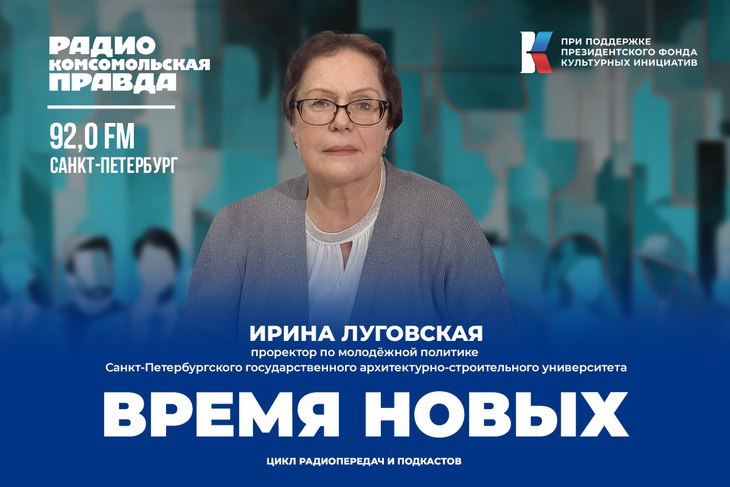
SPbGASU Vice-Rector for Youth Policy Irina Lugovskaia took part in the special project “Time of the New” of the Komsomolskaya Pravda radio and shared her thoughts on the patriotic education of the younger generation, the promotion of family values and the fate of the country in general. We publish her statements.
In your opinion, in what direction is our country going and what will it be like in five years?
I think that our country is moving in the direction of renewal, a certain reboot - emotional, intellectual, political. I believe that in five years the country will become more independent and self-sufficient. The main thing is that we establish universal human values that are understandable to all Russians and accepted by them, regardless of their age and status. This will allow us all to look and move in one direction.
What needs to be done so that young people stop looking abroad, in particular, at Western countries?
In my opinion, in recent years the younger generation has begun to look less at the West and abroad. But in order to slow down this trend or stop it altogether, we need to do everything possible to make our country better than there. The topic of my doctoral dissertation is related to research, including the education systems of foreign countries. At the end of the last century, I often visited many Western schools and universities and was impressed. Students lived in luxurious dormitories with single rooms, laundries, cafes, and gyms. This was not the case in Russian educational institutions back then. Now such facilities are being created in our country, but, unfortunately, not all Russian universities yet have them. In order for young people to stop staring at such foreign material goods, they need to be provided with them in their own country. Now a lot is changing, a lot has already been done, and many things can no longer surprise us, including our younger generation.
What should culture and art be like for young people?
First of all, interesting for them, corresponding to their needs and understanding. Introduction to culture and art should include a cognitive, motivational components, and provoke emotional experiences. In addition, culture and art must be accessible to young people. For example, the Pushkin Card is very good government support, but often the funds allocated for it are not enough. Therefore, it is necessary to promote culture and art, and to help young people at the socio-economic level. Then they will join in.
How to solve demographic problems in Russia?
In my opinion, to solve the demographic problem we need to systematically promote family values among young people and create favorable conditions for young families. Young people should be confident in the future, then they will be more active in starting a family.
Does Russia need an ideology?
Any society needs ideology. I belong to the generation of the Soviet era, when our entire lives were saturated with ideology. There was a lot of criticism of this kind of life. But when this ideology was gone, they realized its importance and necessity. It's impossible without it. There must be values, moral ideals, life goals, guidelines related to serving people, a chosen cause, and the Motherland. Without this, it is difficult for a person to live at all times. And future generations will not be able to exist without this.
What is patriotism?
It is a civic position, indifference to what is happening nearby on a micro- and macro- scale. This is unconditional love for your family and homeland. I always remind students that they don’t choose their homeland, just like their parents. This is sacred. Patriotism is serving your chosen cause, people, the family into which you were born and which you created. And the attitude to business: you need to live and work honestly.
What are Russia's strengths and weaknesses?
Our strength is in our history, which creates a sense of pride. There is strength in our diverse culture. Strength lies in the people who make our history and culture happen.
But our country is large, and it is difficult to implement serious large-scale ideas when plans are constantly changing. A huge country is a huge ship, and you can’t constantly turn it from side to side. This is not a small boat that can maneuver quickly. Unfortunately, we do not always make fully informed decisions. Yes, then we abandon them, admit our mistakes, and move on. In my opinion, generally speaking, there is a certain flaw here, a slippage, a problem. I studied approaches to developing pride in one’s culture and country in the Northern European countries, where I spent quite a lot of time doing scientific work. Once in a Norwegian school I attended a lesson in a primary school. The purpose of the lesson was to develop pride in their country. The pupils opened bright A4 brochures with a maximum of seven pages. Famous composers included Grieg, and travelers included Nansen and Amundsen. It was three pages. Next we talked about the cheese knife, which was invented by the Norwegians, but the Swedes dispute this fact. We talked about a paper clip, the authorship of which is also being debated. This is practically all that one can be proud of for the country. And on the basis of such meager facts, patriotism is diligently formed in children.
And how many composers, travelers, writers and poets do we have? Of course, their heritage is studied, but mainly at the level of the subject, knowledge component. Much of what we have is not used specifically for educational purposes, in the context of the formation of moral universal values.
Listen to the recording of Irina Lugovskaya's speech in the project "Time of the New" can be found at the link.